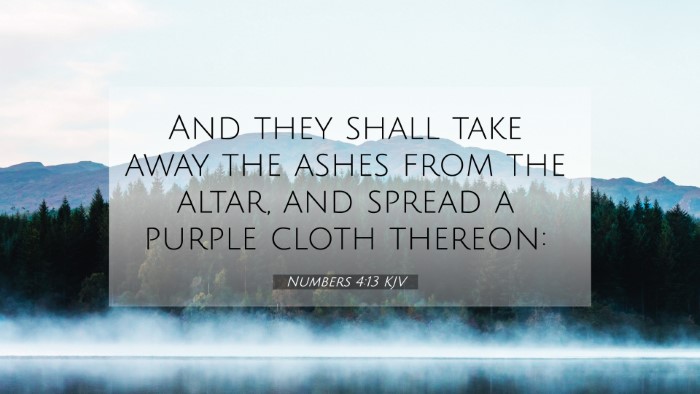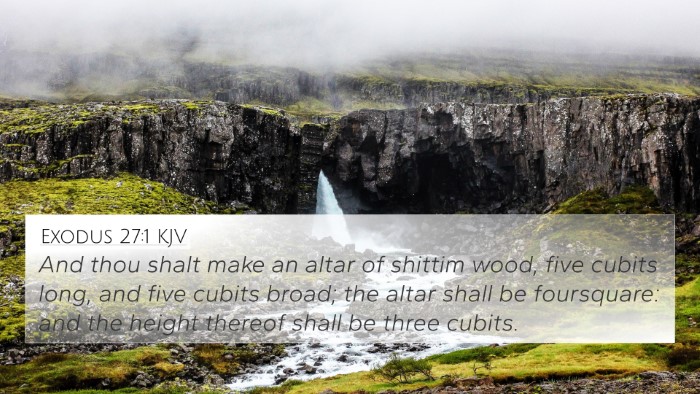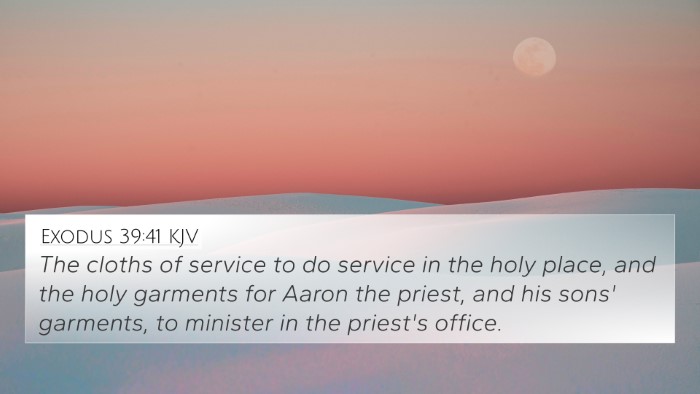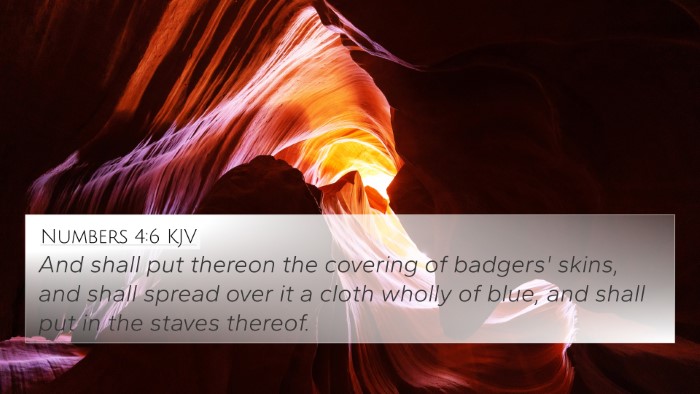Understanding Numbers 4:13
Numbers 4:13 states, "And they shall take away the ashes from the altar, and spread a purple cloth thereon." This verse addresses the preparations the Levites undertook in the service of the tabernacle, focusing on cleanliness and reverence in worship.
Summary of Commentary Insights
This verse emphasizes the importance of removing impurities and maintaining a holy space for worship. The actions described reflect a deep respect for the sacred elements of the altar, which serves as a symbol of God’s covenant with His people.
Key Themes and Interpretations
- Cleanliness in Worship: The removal of ashes indicates the need for inner and outer purity in approaching God.
- Significance of the Altar: The altar represents the place of sacrifice and atonement, foundational concepts in Israelite worship.
- Role of the Levites: This act underscores the responsibilities of the priestly tribe, emphasizing their dedication to maintaining the sanctity of worship.
Bible Verse Cross-References
Understanding Numbers 4:13 can be enriched through cross-referencing with the following verses:
- Leviticus 6:10-11: Discusses the priestly duties associated with the altar, including the handling of ashes.
- Exodus 30:10: Mentions the annual atonement and the significance of the altar in maintaining the covenant.
- Hebrews 13:10: Points to the altar as a symbol of Christ’s ultimate sacrifice.
- Ephesians 5:26: Reflects on the cleansing aspect of God’s word, akin to the physical cleansing of the altar.
- 1 Peter 2:5: Discusses believers as living stones being built into a spiritual house, drawing a parallel with the altar's sanctity.
- Revelation 8:5: The prayers of the saints rising from the altar, illustrating the sacrificial role it plays in divine communion.
- Isaiah 6:6-7: The purification process, connecting the themes of purity and divine encounter.
Connections Between Bible Verses
This verse connects with various themes across scripture, demonstrating the interconnectedness of biblical texts. Here are a few notable connections:
- Old and New Testament Insights: The concept of clean and unclean rituals resonates throughout both Testaments, demonstrating continual themes of holiness.
- Thematic Connections: Links become apparent in understanding God's meticulous nature in relationship with His people through the rituals of the altar.
- Covenant Significance: Typologically relates the actions at the altar to Christ's sacrifice and the grace given to believers, forming a cohesive narrative throughout scripture.
Tools for Bible Cross-Referencing
To explore further, consider utilizing the following:
- Bible Concordance: A tool that allows for easy searching of topics and terms across the bible.
- Bible Cross-Reference Guide: A helpful resource for identifying connections between verses.
- Cross-Reference Bible Study: Methods that enhance the understanding of scripture through comparative analysis.
Conclusion
Numbers 4:13 is not just a historical detail but encapsulates profound truths about worship, sacrifice, and the nature of God’s holiness. By engaging in cross-referencing, readers can derive a multidimensional understanding of this verse and its implications. As one studies these connections, they open up a rich dialogue within the entirety of scripture, revealing the depth and breadth of God's interactions with humanity.
FAQs: Exploring Related Bible Verses
- What verses are related to Numbers 4:13?
Several verses, including those in Leviticus and Ephesians, provide valuable insights into the themes surrounding worship and purification.
- How do Numbers 4:13 and Leviticus 6:10-11 connect?
Both verses discuss the practices associated with the altar and the priestly responsibilities of maintaining holiness.
- Why is the altar significant across various scriptures?
The altar is a recurring symbol of God's atonement and presence, illustrating the heart of worship throughout the Biblical narrative.








